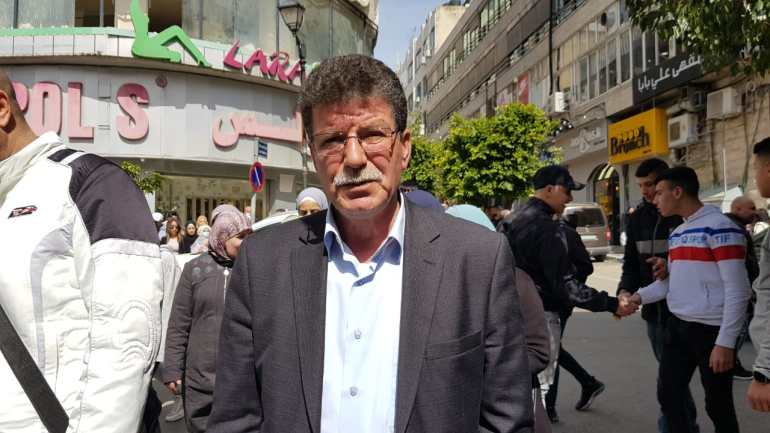Ramallah -
The family of the Palestinian prisoner, Zaid Bassisi, from the city of Tulkarm (northern West Bank) was overjoyed after the prisoners announced that they had suspended the collective strike step after their demands were met.
Yesterday, Thursday, March 24, the captive movement announced the suspension of the strike, after the prison administration responded to the prisoners' demands to undo the punitive measures it imposed on them after the Freedom Tunnel operation last September.
In a statement to them, No. "10" and signed on behalf of the captive national movement - the Supreme National Emergency Committee, the prisoners said, "We have succeeded in achieving many breakthroughs in the demands and achievements we have worked on for years to achieve them."
As for the Bassisi family, the prisoners’ cancellation of the strike dispelled their fear for his health, and he lost a lot of weight and affected his health after the isolation measures that were imposed on him after the escape from Gilboa prison, and his brother Adnan told Al Jazeera Net, “On the day the prisoners liberated themselves from Gilboa prison, Zaid was transferred To complete isolation, he moved for months between more than one prison in isolation, and this affected his health greatly, and it was difficult for him to enter a hunger strike.
President of the Palestinian Prisoners Club Qaddoura Fares: The strike step was the last option of the prisoners (Al-Jazeera)
Not only Zaid, who was sentenced to life imprisonment and 55 years, the family also feared for the younger brother “Ahmed”, who is sentenced to 25 years, who was also subjected to penalties and was denied the completion of his university studies after he was transferred from his punitive prison, because he is also a prisoner of Islamic Jihad. “The strike step is important for the prisoners,” Adnan said. Those who suffered a lot from punitive measures, but we, their families, feared for their health and that the strike would be prolonged.”
Over the course of a month and a half, the prisoners - numbering 4,400 prisoners, including 32 female prisoners and 160 children - waged protest measures against the prison administration's imposition of punitive measures against them, which consisted in isolating the leaders of the organizational bodies of the prisoners of Islamic Jihad, as is the case with the prisoner Zaid Basisi, and expanding the classification of the most dangerous prisoners and what It resulted in imposing penalties on them by preventing visits, isolation and permanent movement between prisons, reducing the period of rest (the daily break), returning visits to prisoners in the Gaza Strip, and enabling female prisoners and sick prisoners to communicate by phone with their families.
The hardest choice
During that, the prisoners threatened to launch a collective strike in all prisons if the prison administration did not respond to their demands, which is the prisoners' last pressure card.
According to the head of the Palestinian Prisoners Club, Qaddoura Fares, the strike step was the prisoners' last option, which forced the prison administration to reverse its position. This step is not easy for the administration to deal with, although it is the most difficult choice for the prisoners.
In his interview with Al Jazeera, Fares said, "This strike would have been different from the rest of the collective strikes that the prisoners waged in prisons. It is not a demand strike, but rather a strike to stop a set of measures and confront a campaign of sanctions imposed on them, in addition to the fact that most organizations in prisons would have participated in this strike, such as Fatah." Hamas, Islamic Jihad, the Popular and Democratic Fronts, and this put additional pressure on the prison administration."
He added, "The Prison Authority administration, through its procedures, tried to separate the prisoners, but the opposite happened. The prisoners organized themselves and formed a joint body that led their protest steps and dialogue with the administration, which strengthened their position."
Fares believes that this is the first time in the history of prisons that the dialogue is through a unified organizational body, which means that the prisoners have become in a position of strength in a battle that would undermine any attempt to impose dictates on them.
The prisoners' hunger strike imposes a heavy burden on the Israeli prison administration, says Fares, and it is trying by all means to pressure the prisoners to retract it.
According to the Palestinian Prisoners Club, the prisoner movement has waged 24 collective strikes, in addition to more than 400 individual strikes, specifically since the end of 2011.
Empty Intestine Achievements
Throughout the life of the captive movement, collective strikes were the most powerful pressure card on the prisoners, despite the difficulty of waging them on the prisoners, as they required organization, determination and a will to engage in such strikes.
The prisoner released in the Wafa al-Ahrar deal in 2011, Fakhri al-Barghouti, believes that most of the prisoners' life demands were fulfilled after they engaged in this type of strike.
Barghouti was detained for 34 consecutive years, during which he engaged in a total of 12 mass strikes;
The first was two years after his arrest in 1980, when the captive movement went on strike for 18 days in solidarity with the Nafha prison strike, which the unarmed prison administration imposed on him, the last of which was his strike in 2004.
Barghouti told Al Jazeera Net, "The hunger strike at that time was a continuation of another struggle against the occupation, and a continuation of the struggle outside prisons."
In 1992, the strike was the most successful in his opinion, as the captive movement achieved all its life demands in prisons, as the prison administration was depriving prisoners of the most basic necessities of life. .

